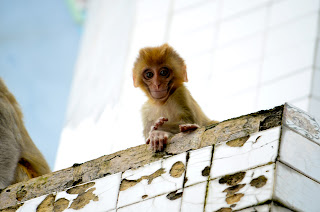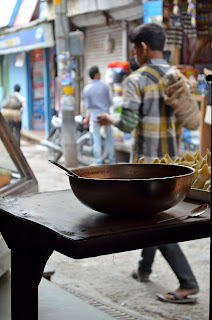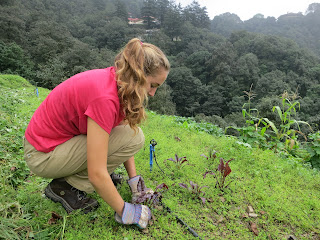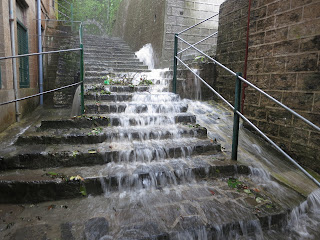The week before last, our Hindi tutor, Mohammed Yousef Ansari, a lifetime Mussoorie resident and a professor at the Woodstock School, offered to take us to his mosque, show us around, and talk to us a little about Islam, as well as specifically about Islam in India. This past Sunday morning, we took him up on that offer and met him in town, in front of our group's favorite chai and sweet shop. From there, he walked with us to his mosque, pointing out his house along the way. A couple days later, at our tutoring session with him, we got to talking about house prices in Mussoorie, and Yousef told us that his home, which from his description seemed to be in total about the size of one of my high school classrooms, would sell for two million rupees, about $40,000. That may not seem like a lot when you compare it to house prices back home, but when you think about the size, the relatively poor upkeep of the surrouding area, and the fact that the average meal price for most Indians is somewhere around a dollar, two million rupees becomes an unbelievably steep price. Yousef told us that even he, on his middle-class salary of around 40,000 rupees a month, or a bit less than $9,000 a year, would never have been able to afford his house if it hadn't become his by inheritence. In a city like Mumbai, he told us, some one living on his salary would probably still be living in a slum. It is unbelievable to me that India, a country with a relatively weak currency, filled with millions of unimaginably poor people, and even more importantly, a middle-class that earns an average amount far below the poverty line in America, would have such an explosively expensive real estate market.
Yousef also explained to us that soon after India gained independence, a law was passed that made it almost impossible to remove a tenent once they have lived in a certain property for more than three years. This law was inacted to protect the almost 99 percent of Indians who didn't own property from the few very wealthy people who did. The law also dictated that rent could only be raised at a rate of 5 percent every so many years. Nowadays, this law means that people often become unable to utilize their own property and, as a result, it is very difficult for Indians to find homeowners willing to rent to them, as they much prefer renting to foreigners who they know will move out in a number of years and won't hold their property hostage for generations. Additionally, since the permitted rent increase doesn't even come close to matching the inflation rate in India, the law also means that in a case like Yousef's, where part of his family home was originally rented out by his grandfather 50 years ago, he now pays many times more in property tax than he recieves in rent. Yousef and his brothers, after marrying and starting families of their own, came to need the entire house, and in order to make use of the property they own, they ended up having to pay bribes to their tenants' lawyers, pay their own lawyers, and finance 80 percent of the purchace price of a new house for their tenants. The total amount of money they spent could have purchased an entire new house for themselves, but without being able to increase their tenants' rent in the old house, they were losing too much money, and thus found themselves stuck in a catch-22.
At the mosque, Yousef sat down with us on the criss-cross of woven mats covering the floor, and began to talk to us about the five pillars of Islam, its different rituals, its holidays and its prayer schedule. Afterwards, he demonstrated for us one set of the traditional prayer positions, beginning standing, going through all the different bowing motions, and ending up on his knees. Even though I had heard many times about the similarities between Islam and Judaism, I found it really interesting to hear about these similarities from Yousef as he told us about what he felt were the basics of Islam: Yousef spoke about how prayer is a time-regulated, more than once a day activity, and about how the daily prayer times change as sunrise and sunset changes. He also spoke about beginning to fast during Ramadan at the age of 13, and about how women, unlike men, are not required to pray at a mosque.
Yousef told us that Islam in India is the world's largest minority, but that it is also India's poorest minority. The majority of the Indian Muslim community works low-paying labor-intensive jobs. He said that he worries about sending his children to Muslim "sunday schools" because it is environments such as those, full of the destitute and the hopeless, that breed extremist thought.
For a brief interlude, before I talk about the Jain temple that Yousef took us to next, here are pictures of the adorable and fascinatingly human-like monkeys that were practically swarming the area outside of the mosque (and that, in general, are constantly roaming the streets of Mussoorie):






The Jain temple, just down the road from Yousef's mosque, with its intricate carvings, clean white exterior, marble floors and gold decoration, clearly serves a much wealthier (and, in fact, much smaller) population than its neighboring mosque. Yousef knew the Jain "priest" well and translated for us as he spoke a little about Jainism. Jainism originated in India and has many similarities to Hinduism, although it has its own gods and holy book. One of Jainism's most significant tenets is non-violence, including against animals, and even insects. While we were at the temple, we witnessed a family come in and complete a Jain prayer ritual, which included offering rice, saffron rice, cardamom, cloves and almonds to the god, an intricate, fully gold buddha-like figure, sitting impressively in an alcove in the wall.
 |
| The beautiful domed ceiling of the Jain temple |
This past week, unfortunately, did not include any such explorations, but we did fall in to a good routine, a busy, walking-intensive, elevation fluctuating one. I'm sure that I've never walked so much in my life, and certainly not if you factor in the significant portion of our daily trekking that involves near-vertical inclines. At first, having to do these walks at an elevation of more than 7,000 feet was taking its toll on my lungs, and now, well, it still is, but I've come to appreciate how active we are, and how self-sufficient winding up and down mountainsides makes me feel. It's true, I still hate the inclines, but the 2.5 mile walk in to town now feels like a standard stroll, and in fact, is one of my favorite things about about being here - mostly because every single time I walk in to town, despite the fact that it is the same single road-route every time, I can't leave without my camera; there is always something new and interesting to see, always something I missed on a previous walk, always something I'm seeing in a new light, literally and figuratively.


It's been really amazing to have a growing sense of independence here, whether in terms of my language, navigation, or other skills. In terms of language, I'm finding my limited vocabulary and grammar skills slowly combining and allowing me to, if only briefly, express myself in Hindi, rather than English. Just yesterday, I found myself asking the Woodstock School chef, "
kya yeh veg hai?", "is this veg (the bizzarely cute word used ubiquitously instead of vegetarian)?" Earlier this week, when I was at the tailor's being measured for my first-ever custom-made
kurta (an experience similar to being a little child in a candy shop, in which I got to pick out material from stacks upon stacks of options, sift through millions of types of trim, and dictate how I wanted it all put together), he had me write my name down on his list of measurements and asked me if I could do it in Hindi script. I did, successfully, and he looked down at the paper and asked, "Hannah?"
Another big portion of our stay in Mussoorie is the work we've been doing at the Turner Organic Garden. The walk down to it every afternoon is daunting and I can't say that the time we spend there is among my finest moments, but it is really nice to contribute and be active. Our group tends to split up in to the weed-ers and the machete-ers. I started off weeding, but found that I have a lot more fun hacking down all the overgrowth encroaching on viable, plantable land. On Thursdays, we spend some of the time harvesting, which this past week included uprooting, cutting and cleaning lettuce and bok choy. The biggest accomplishment our group has achieved so far (which I have to give most of the credit for to Danesh and Urmila, our overseers at the garden) was building a mini-greenhouse. It was a pretty basic project, consisting mostly of bamboo, string and special plastic tarp, but it was really nice to be able to see the concrete fruits of our labors, as opposed to the more abstract sense of accomplishment that comes with weeding and hacking.
 |
Ada
Photo cred to Tyler Fair |
 |
Nick
Photo cred to Tyler Fair |
 |
| Photo cred to Tyler Fair |
 |
| Walk up from the Turner Garden |
 |
| Walk down to the Turner Garden |
I mentioned earlier this post that my favorite thing about being in Mussoorie is the walk in to town, but I have to qualify that statement and say that it's my favorite thing to do here in Mussoorie. What really touches me as the most magical part of Mussoorie (tied perhaps with the clouds) is the monsoons we've been experiencing recently. When we came, we were told that monsoon season seemed to be coming to a close, and the thunderously loud, ground-shaking thunder we experienced several times was limited to the middle of the night. I kept hoping that I would be able to experience one of Mussoorie's notably intense storms during the day, instead of when I was trying to sleep, and yesterday, struck by our first-ever daytime monsoon, I got my wish. It was right after lunch, and suddenly, Woodstock School became one massive shower, every staircase, ramp and wall turning into raging waterfalls, and the ground metamorphosing into an assembly of overflowing lakes, rivers, and tributaries. Standing in the middle of it all was, by far, one of my favorite moments in Mussoorie so far.
 |
| Photo cred to Tyler Fair |
 |
| Photo cred to Tyler Fair |
But for the most important information in my entire post: I'm meeting the Dalai Lama tomorrow! Stay tuned:)

















No comments:
Post a Comment